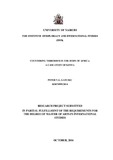| dc.description.abstract | This explores counterterrorism approaches in the Horn of Africa using Kenya as case
study. The study investigates the performance of existing counterterrorism strategies
and proposes a more comprehensive approach that includes all stakeholders, in the
Horn of Africa and Kenya. This study uses Constructivism theory of International
Relations as a tool to explain international terrorism and the best strategy to counter
terror. The study accepts the hypotheses that: the State centric counterterrorism
measure in the horn of Africa excludes non-state actors and has failed to combat
terrorism; Increased acts of terror have been consequences of the Kenyan Government
institutions focusing only on militaristic strategies, ignoring non-militaristic ones; and
combined effort by both the state and Non-state actors ensures success in the fight
against terror.
The data findings indicates that the counterterrorism strategy in Kenya have still not
addressed preventive terrorism measures such as enhanced partnerships between
government of Kenya and domestic NSAs to counter extremism and radicalization, as
well as other root causes of terrorism; the strategy lacks an effective combating of
terrorism, limited effort of continued diplomatic solutions to restore stability in
adjoining countries, and less progressive cooperation with external actors The analysis
points out that: State centric counterterrorism measures in the Horn of Africa is
counter-productive;the government of Kenya focuses on militaristic strategies in the
fight against terrorism; and the government‟s militaristic approach in counterterrorism
has not been effective. Furthermore, the militaristic and State centric approach in
counterterrorism such as crack down, illegal detention, and extra-judicial killings of
terror suspects and innocent victims has fueled terrorism. Also the inclusion of Non-
State Actors, just governance, equality and other soft-power measures reduces
terrorism.
The study recommends a national counterterrorism and counter violent extremism
plans that involves State and non-State actors; other effective counterterrorism strategy
that includes elements of border managements, diplomatic arrangements, addressing
marginalization of Muslims and equipping the security forces; and finally a grand
strategy to countering terrorism in Kenya. Such multilateral grand strategy involves
strengthening regional and international actors in the unstable Somalia,fight against
corruption as a loophole of counterterror, supersession of regional interest in peace and
security over national interest of coalitions in Somalia, prioritization of regional
information sharing and coordination of intelligence,regional support to the economic
development of Somalia to address some elements of terror root causes and robust
border control and screening of criminals from refugees. | en_US |



